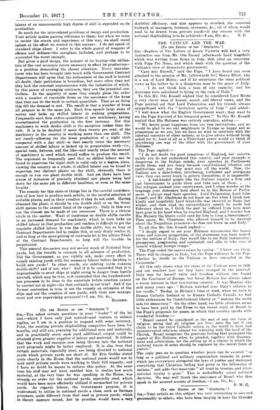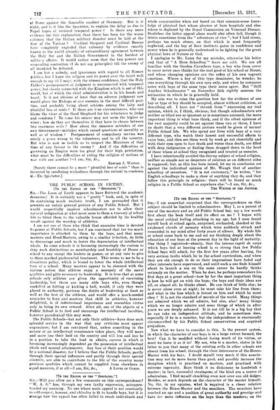[To me Emma or ees " Sexeraros."1 Sta.—Your article on
this subject was very interesting to flier and ProabIllablY to others, who have been longing to hear the thunder
e Rome against the damnable conduct of Germany. But is it right, and is it like the Spectator, to explain the delay as due to Papal hopes of restored temporal power ? Is there any more evidence for this explanation than there has been for the worse ailumity that the Italian military disaster must be laid at the door of the Vatican ? Cardinal Gasparri and Cardinal Bourne have completely exploded that calumny by evidence (mostly known to the world already) of extraordinary agreement between the Holy See and the Italian Government in the hardest of militasy affairs. It would rather seem that the two powers are suspending contention (I do not say principles) till the enemy of all mankind be defeated.
I am but a nobody, and ignoramus with regard to all Raman politics, but I know the religion and its power over the heart well enough to say (if I may), with the utmost confidence, that the Holy Father's postponement of judgment is unconnected with temporal power, but closely connected with the Kingdom which is not of this world, but of which the chief administration is in his hands and heart. Is it. not obvious at least that an adverse judgment now would place the Bishops of our enemies in the most difficult posi- tion, and probably bring about saisros among the laity and plentiful loss of souls? If these are true circumstances, who can blame the vicar of the Good Shepherd for his reluctance to judge and condemn ? To some his coarse may not seem the higher or wiser how do they act themselves if they have to choose between two enormous evils ? How about the immense mistakes of our own Government—mistakes which raised questions of morality as well as of wisdom ? Postponement of compulsory service was surely a gross wrong to the volunteers and to all the country. But who is now so foolish as to suspect the Ministers of that Sitar of any favour to the enemy ? And if the difficulties of governing an Empire were too great for their high patriotism, what must be the difficulties of ruling the religion of nations at war with one another P—I am, Sir, Ac.,
EDWARD J. 'WATSON. [Surely there cannot be a more "plentiful loss of souls" than is incurred by condbning wickedness through the refusal to condemn it.—En. Spectator.]



































 Previous page
Previous page